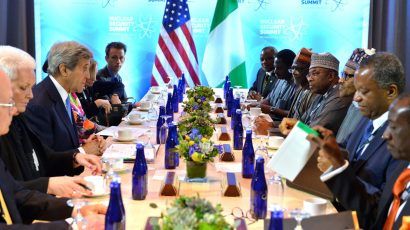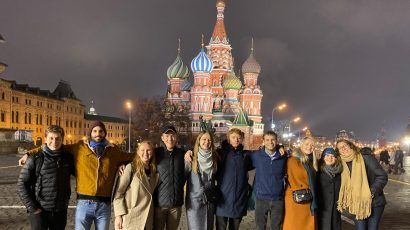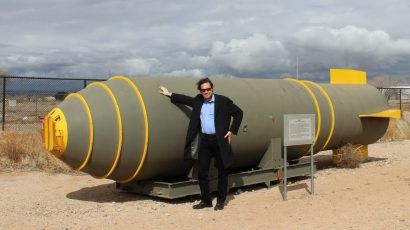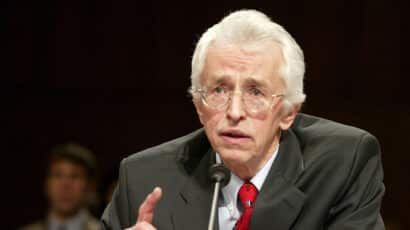Search results for nuclear terrorism
The controversial legacy of the Nuclear Security Summit
Although it has been only two years since the conclusion of the fourth and final Nuclear Security Summit, it feels as though nuclear politics have been on fast-forward. China, Russia, and the United States are modernizing their nuclear arsenals; North Korea has openly tested intercontinental ballistic missiles; and the pressure for disarmament has found a … Continued
A brighter future for Iranian nonproliferation?
Iran’s cooperation with the Czech Republic on civilian nuclear energy is a good sign for the rest of the world.
Breaking gender barriers: Ruth Bader Ginsburg and … Marie Skłodowska Curie
Like Marie Skłodowska Curie before her, Justice Ginsburg inspires many more than just those who would join her own profession.
Three major nuclear accidents, as seen by young American and Russian professionals
We asked a group of young American and Russians professionals to do a deeper dive on the issue of nuclear safety after last summer’s airing of the popular HBO miniseries Chernobyl. The miniseries took a lot of liberties with the technical facts, but it captured the personal hardships and suffering of the nuclear disaster. We expanded the problem to include the nuclear accidents at Three Mile Island in the United States and Fukushima in Japan, so as to cover the effects of the world’s three major nuclear accidents on the future of nuclear power.
Politics, bureaucracy, and the proliferation of nuclear knowledge
In October of 1996, Vladimir Nechai committed suicide. His death was newsworthy, but not because of the means; suicide was not so unusual in Russia, largely due to the widespread financial deprivation in the years following the collapse of the Soviet Union. Nechai's act was reported by the Western news media because of his position as director of one of the Soviet Union's premier nuclear weapons research and design facilities. According to the note he left behind, Nechai took his own life partially out of shame.
Formal risk assessments and nuclear arms control: exploring the value of modern methodologies
Future arms control negotiations would benefit from modern risk assessment technologies.
Alex Wellerstein pulls back the curtain on nuclear secrecy
Alex Wellerstein, author of Restricted Data: The History of Nuclear Secrecy in the United States, talks with Bulletin associate editor Susan D’Agostino about nuclear espionage, security theater, and even an occasion in the 1950s when the Bulletin of the Atomic Scientists kept a nuclear secret.
Letter from Pakistan: How an unfair non-proliferation regime undermines nuclear security
In a September 1967 speech, V.C. Trivedi, the Indian Ambassador to an early UN arms control effort known as the Eighteen Nations Committee on Disarmament, said that developing countries could tolerate nuclear weapons apartheid, but not an atomic apartheid that prevented them from attaining the economic progress that civilian nuclear power can bring. Regrettably, today's global nonproliferation architecture is being applied with such selectivity that it can truly be called the neo-nuclear apartheid.
Should South Korea be Iran’s next nuclear energy partner?
The idea may raise alarm bells at first, but the implications of Seoul-Tehran nuclear cooperation merit further study.
An excerpt from “Hinge Points: An Inside Look at North Korea’s Nuclear Program”
An excerpt from the preface to "Hinge Points: An Inside Look at North Korea's Nuclear Program," a book written by Siegfried S. Hecker with Elliot A. Serbin (Stanford University Press, January 2023).
U.S.-Russian nuclear agreement raises serious concerns
On May 13, President George W. Bush submitted to Congress an agreement for peaceful nuclear cooperation with the Russian Federation. The "123 agreement"--named after a provision of the 1954 Atomic Energy Act--would establish a 30-year framework for nuclear commerce between the former Cold War enemies, allowing the transfer of nuclear commodities such as reactor components and U.S. government-owned technologies and materials to Russia.
U.S.-Russian nuclear agreement raises serious concerns
On May 13, President George W. Bush submitted to Congress an agreement for peaceful nuclear cooperation with the Russian Federation. The "123 agreement"--named after a provision of the 1954 Atomic Energy Act--would establish a 30-year framework for nuclear commerce between the former Cold War enemies, allowing the transfer of nuclear commodities such as reactor components and U.S. government-owned technologies and materials to Russia.
Dawn of a new Armageddon
A personal essay on the meaning of a ballistic missile alert issued in Hawaii in January 2018, at the height of nuclear tensions between the United States and North Korea.
Nowhere to hide: How a nuclear war would kill you—and almost everyone else. (Chinese)
In a nuclear war, hundreds to thousands of detonations would occur within minutes, resulting in tens to hundreds of millions of people dead or injured in a few days. But a few years after, global climatic changes caused by the many nuclear explosions could be responsible for the death of more than half of the human population.
U.S.-Russian nuclear energy cooperation: A missed opportunity
The July Moscow summit didn't produce any significant breakthroughs in U.S.-Russian relations. In fact, it really only highlighted that the problems Moscow and Washington are ready to cooperate on are international, not bilateral, in nature (e.g., nuclear nonproliferation, terrorism, drug trafficking). On further strategic arms reductions--the most anticipated topic at the summit--the early results aren't as impressive as advertised.
Nuclear Roundup: 12/02/16
A compilation of quality nuclear policy news published on the Web, around the world. Iran Nuclear Deal Senate Votes to Extend Iran Sanctions Authority Iran says U.S. extension of sanctions act violates nuclear deal Trump team eyes proposed new non-nuclear sanctions on Iran: FT Iran’s nuclear deal just the tip of the iceberg for Trump … Continued
Nuclear Roundup: 4/20/2017
A compilation of quality nuclear policy news published on the Web, around the world. Iran Nuclear Deal White House Shouldn’t Try to Reverse Iran Nuclear Deal, Parsi Says Tillerson slams Iran nuclear deal as ‘failed approach,’ vows ‘comprehensive review’ Watch Tillerson’s full statement on Iran Trump Administration Sends Mixed Signals About Iran Nuclear Deal Trumplomacy: … Continued
Nuclear Roundup 2/20/2017
A compilation of quality nuclear policy news published on the Web, around the world. Iran Nuclear Deal PENCE: IRAN WON’T HAVE NUCLEAR WEAPONS TO USE AGAINST US OR ISRAEL Tillerson: I didn’t suggest scrapping Iran nuclear deal Don’t abandon the Iran Nuclear Deal, embrace it to build regional peace Trump’s demand for revising Iran’s nuclear … Continued








